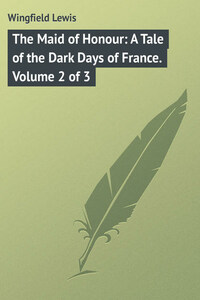CHAPTER I.
ON THE VOLCANO, 1789
Although there was no cash in silken fob or broidered pocket, the Elect denied themselves no luxury. Bejewelled Fashion was sumptuously clad: my ladies quarrelled and intrigued, danced and gambled-my lords slept off the fumes of wine, and mopped the wounds begot of midnight brawl; then drank and fought again.
Money? No credit even. Trade was at a standstill, yet the court was uproariously gay.
Money and credit-sinews of pleasure as well as business-having flitted from lively Paris, you might suppose that the wheels of Society would cease to turn-that the flower-decked car of gilded Juggernaut would come creeping to a standstill. Not yet. Impelled by the impulse of its own velocity, it continued to crush on awhile. Those who knew were numbed by the chill shadow of the inevitable, or rendered callous by the knowledge of their helplessness. Those who were deaf and blind groped blissfully on in their lighthearted ignorance. Selfish all, depraved most, the blue-blooded sang in merry chorus, "Let us eat and drink that the worms may grow fat on us." Not so the gaunt crowds whose blood was but mud and water. As their long-suffering ancestors had monotonously done, they groaned in unison, crying to God for death, as the only release from misery.
What if whole villages were decimated by famine? What if plague and starvation stalked through the towns? My lords and my ladies cared not, for they were poised too high to see. Were the grovelling creatures slaves or insects? Slaves, for they delved patiently, with moans that were vain bleatings as of sheep; whereas outraged insects for the most part sting.
We all know that the first duty of serfs is to labour for their betters: their second, when the worn machinery is out of gear, to retire underground with promptitude. How unseemly-nay, revolting, therefore, is their conduct when, weary of groaning and of teeth-gnashing, they belabour with fists instead!
The scene we look upon is a tranquil and a pretty one, despite certain vague and ominous rumours which, intangible, permeate the air. The favourite saloon of Her Majesty, Marie Antoinette, in the Palace of the Tuileries, is a small, square chamber decorated with raised garlands, flutes, and tambourines in carved wood, painted a dead white, mellowed now by the glimmer of many candles, shaded. Curtains and furniture are yellow, embroidered with gold; the bare floor is waxed and polished, reflecting the costly and varied rainbow garb of some forty assembled guests. Through open casements-it is a warm evening in July-we mark the majestic outline of the venerable Louvre cut black against the blue-a calm unclouded blue, loftily oblivious of angry curls of darkling smoke which two days since uprose from the ruins of the stormed Bastile. Doors as well as windows are spread wide to woo the air; a bevy of ladies, glittering with gems, are fanning themselves languidly. Through the portals on the right you obtain a glimpse of the remains of supper: a dainty repast, fit for fastidious fairies; such an ideal cosy feast as the queen loved to conjure for her familiars. Through the left door we may perceive an array of green tables with gilt legs, at which gentlemen clad in satins of delicate hue are squabbling over the devil's books. Their voices from time to time grow angry, their talk unduly loud. But for the adjacent presence of the queen, swords might be drawn and blood spilt. Young Monsieur de Castellane, officer in the Swiss Guard, has just lost his paternal acres to the Marquis de Gange, a fact which, in the latter, seems to evoke no sign of interest. With the usual luck of players who are quite indifferent, Fortune had befriended the marquis, and yet, as things were, the prize was an empty bauble-a mere meaningless array of lands with high-sounding names which looked vastly well-on paper.
The Marquis de Gange was an absentminded person, given to reverie and the contemplation of the infinite, and it is somewhat annoying to lose even paper property to one so utterly unappreciative.
Roused by the congratulations of the surrounding group of butterflies, the marquis descended for a moment to earth, and laughed lightly.
"A profitable stake to win, in sooth," he observed, with a yawn. "Castellane! I hereby resign your empty title-deeds, having quite enough such foolish lumber of my own. Your part of the country is a caldron, mine is a furnace. Thank heaven, my wife's estates are in a land of peace, or, like many more, we should be beggars."
"It is not given to everyone to mate with a great heiress," remarked rueful Castellane, feeling in his empty pocket.
"You should look out for one," said the marquis, serenely smiling, "for you know that since the Third Estate has raised its ugly head, you don't dare to show your nose at Castellane. The tenants would growl of rights of man, and prod your silk stockings with their pitchforks."
"That's true enough," sighed the young scapegrace, with a puzzled air. "Though they deserve the galleys for their temerity, they are patted on the back by our too lenient sovereign-a mob of insolent ragamuffins! Last time I travelled south, I was worried to fiddle-strings by deputations whom I declined to see-a parcel of unpractical idiots, who, when I demanded rents, babbled of redress of grievances. Really, de Gauge, you may keep the title-deeds, for, since no one will lend a louis on them, they are no better than a musty mockery."














